
John Thomas Sayles is an American independent film director, screenwriter, editor, actor, and novelist. He is known for writing and directing the films The Brother from Another Planet (1984), Matewan (1987), Eight Men Out (1988), Passion Fish (1992), The Secret of Roan Inish (1994), Lone Star (1996), and Men with Guns (1997).
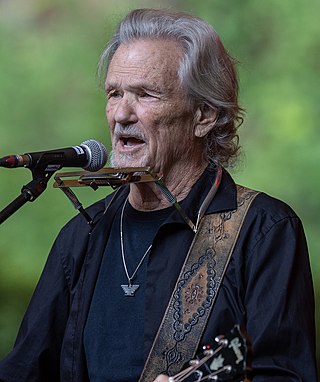
Kristoffer Kristofferson is an American retired country singer, songwriter, and actor. Among his songwriting credits are "Me and Bobby McGee", "For the Good Times", "Sunday Mornin' Comin' Down", and "Help Me Make It Through the Night", all of which were hits for other artists.

Twin Peaks: Fire Walk with Me is a 1992 American psychological horror film directed by David Lynch and written by Lynch and Robert Engels. It serves as a prequel to the television series Twin Peaks (1990–1991), created by Mark Frost and Lynch, who were also executive producers. It revolves around the investigation into the murder of Teresa Banks and the last seven days in the life of Laura Palmer, a popular high school student in the fictional Washington town of Twin Peaks. Unlike the series, which was an uncanny blend of detective fiction, horror, the supernatural, offbeat humor, and soap opera tropes, the film has a much darker, less humorous tone.

"Me and Bobby McGee" is a song written by American singer-songwriter Kris Kristofferson and originally performed by Roger Miller. Fred Foster shares the writing credit, as Kristofferson wrote the song based on a suggestion from Foster. A posthumously released version by Janis Joplin topped the U.S. singles chart in 1971, making the song the second posthumously released No. 1 single in U.S. chart history after "(Sittin' On) The Dock of the Bay" by Otis Redding. Gordon Lightfoot released a version that reached number 1 on the Canadian country charts in 1970. Jerry Lee Lewis released a version that was number 1 on the country charts in December 1971/January 1972 as the "B" side of "Would You Take Another Chance On Me." Billboard ranked Joplin's version as the No. 11 song for 1971.

Prick Up Your Ears is a 1987 British film, directed by Stephen Frears, about the playwright Joe Orton and his lover Kenneth Halliwell. The screenplay was written by Alan Bennett, based on the 1978 biography by John Lahr. The film stars Gary Oldman as Orton, Alfred Molina as Halliwell, Wallace Shawn as Lahr, and Vanessa Redgrave as Peggy Ramsay.

David Russell Strathairn is an American actor. Known for his leading roles on stage and screen, he has often portrayed historical figures such as Edward R. Murrow, J. Robert Oppenheimer, William H. Seward, and John Dos Passos. He has received various accolades including an Independent Spirit Award, a Primetime Emmy Award, and a Volpi Cup, and has been nominated for an Academy Award, a BAFTA Award, two Golden Globe Awards, and four Screen Actors Guild Awards.

Lone Star is a 1996 American neo-Western mystery film written, edited, and directed by John Sayles and set in a small town in South Texas. The ensemble cast features Chris Cooper, Kris Kristofferson, Matthew McConaughey and Elizabeth Peña and deals with a sheriff's investigation into the murder of one of his predecessors. Filmed on location along the Rio Grande in southern and southwestern Texas, the film received critical acclaim, with critics regarding it as a high point of 1990s independent cinema as well as one of Sayles' best films. It was nominated for an Academy Award for Best Writing, and also appeared on the ballot for the AFI's 10 Top 10 in the western category. The film was a box office success, grossing $13 million against its $3–5 million budget.

Stigmata is a 1999 supernatural horror film directed by Rupert Wainwright and distributed by Metro-Goldwyn-Mayer. It was written by Tom Lazarus and Rick Ramage. Its story follows an atheist hairdresser from Pittsburgh, Pennsylvania, who is afflicted with stigmata after acquiring a rosary formerly owned by a deceased Italian priest who himself had suffered from the phenomenon. It stars Patricia Arquette, Gabriel Byrne, Jonathan Pryce, Nia Long, Portia de Rossi and Rade Šerbedžija.

Silver City is a 2004 American political satire comedy-drama film written and directed by John Sayles. Chris Cooper portrays an inept Republican gubernatorial candidate, a character that was noted for similarities to U.S. President George W. Bush. The film's large ensemble cast includes, among others, Richard Dreyfuss, Danny Huston, Michael Murphy, Maria Bello, Kris Kristofferson, Mary Kay Place, Thora Birch, Tim Roth, Billy Zane and Daryl Hannah.
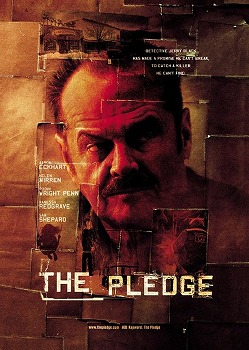
The Pledge is a 2001 American neo-noir psychological mystery drama film directed by Sean Penn and starring Jack Nicholson alongside an ensemble supporting cast of Patricia Clarkson, Aaron Eckhart, Helen Mirren, Robin Wright Penn, Vanessa Redgrave, Sam Shepard, Mickey Rourke, Tom Noonan, Lois Smith and Benicio del Toro. It was in competition at the 2001 Cannes Film Festival.
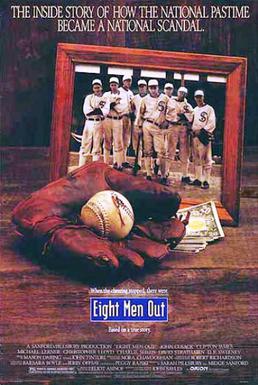
Eight Men Out is a 1988 American sports drama film based on Eliot Asinof's 1963 book Eight Men Out: The Black Sox and the 1919 World Series. It was written and directed by John Sayles. The film is a dramatization of Major League Baseball's Black Sox Scandal, in which eight members of the Chicago White Sox conspired with gamblers to intentionally lose the 1919 World Series. Much of the movie was filmed at the old Bush Stadium in Indianapolis, Indiana.

Easy Riders, Raging Bulls: How the Sex-Drugs-and-Rock 'N Roll Generation Saved Hollywood is a book by Peter Biskind, published by Simon & Schuster in 1998. Easy Riders, Raging Bulls is about the 1960s and 1970s Hollywood, a period of American film known for the production of such films such as The Godfather,The Godfather Part II,The French Connection,Chinatown,Taxi Driver,Jaws,Star Wars,The Exorcist, and The Last Picture Show. The title is taken from films which bookend the era: Easy Rider (1969) and Raging Bull (1980). The book follows Hollywood on the brink of the Vietnam War, when a group of young Hollywood film directors known as the "movie brats" are making their names. It begins in the 1960s and ends in the 1980s.

Johnny Got His Gun is a 1971 American independent epic anti-war film written and directed by Dalton Trumbo, in his directorial debut, based on his 1938 novel of the same name. The film stars Timothy Bottoms, Kathy Fields, Marsha Hunt, Jason Robards, Donald Sutherland and Diane Varsi. It was Trumbo's first and only directorial effort.

Men with Guns is a 1997 American political drama film written and directed by John Sayles, inspired by the 1992 novel The Long Night of White Chickens by Francisco Goldman. It stars Federico Luppi, Damián Delgado, Damián Alcázar and Mandy Patinkin. The executive producers were Lou Gonda and Jody Patton.

City of Hope is a 1991 American drama film written, directed, and edited by John Sayles. The film features Vincent Spano, Stephen Mendillo, and Chris Cooper.
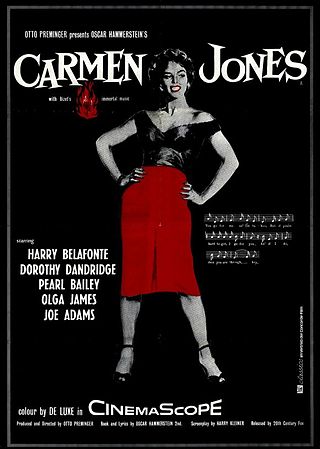
Carmen Jones is a 1954 American musical film featuring an all-black cast starring Harry Belafonte, Dorothy Dandridge, and Pearl Bailey and produced and directed by Otto Preminger. The screenplay by Harry Kleiner is based on the lyrics and book by Oscar Hammerstein II, from the 1943 stage musical of the same name, set to the music of Georges Bizet's 1875 opera Carmen. The opera was an adaptation of the 1845 Prosper Mérimée novella Carmen by Henri Meilhac and Ludovic Halévy.
"Dimming of the Day" is a song written by Richard Thompson and performed with his then-wife Linda Thompson on their 1975 album Pour Down Like Silver.
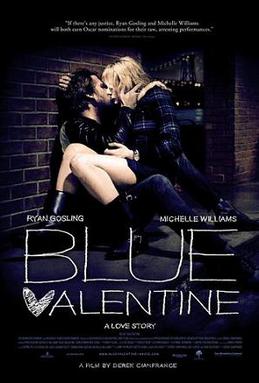
Blue Valentine is a 2010 American drama film written and directed by Derek Cianfrance. Cianfrance, Cami Delavigne, and Joey Curtis wrote the film, and the band Grizzly Bear scored it. Blue Valentine depicts a married couple, played by Michelle Williams and Ryan Gosling, shifting back and forth in time between their courtship and the dissolution of their marriage several years later.
















